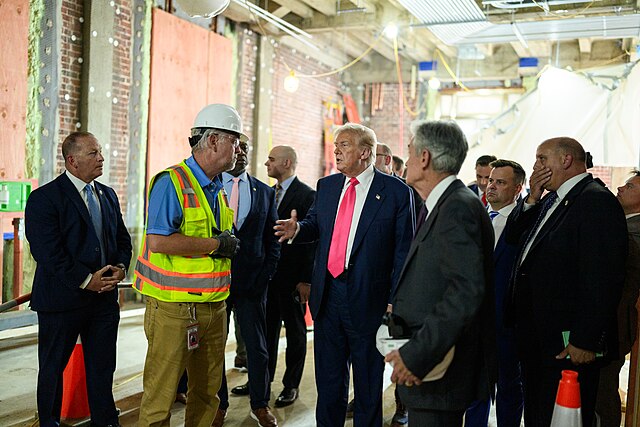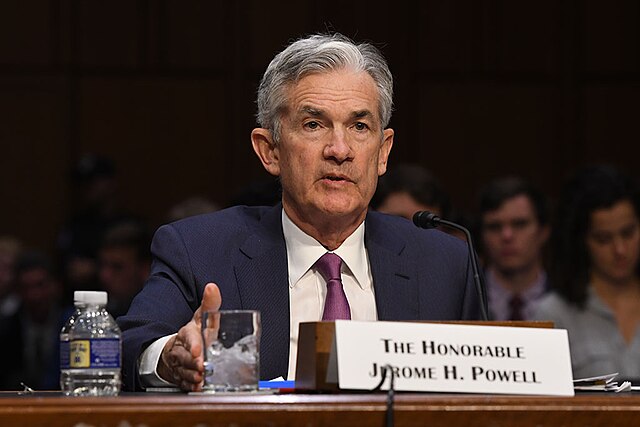David Brady
Staff Writer
President Donald Trump has moved to fire Federal Reserve Governor Lisa Cook for alleged mortgage fraud. Cook, one of seven governors of the country’s central bank and a member of the eleven-man Federal Open Market Committee, is the latest person caught in the President’s crosshairs as he pushes for the central bank to cut interest rates.
The President has pushed for the benchmark rate of the central bank, the Federal Funds Rate, to be lowered as a boost for the economy despite his insistence that the economy remains strong. His usual target is Federal Reserve Chair Jerome Powell, who was appointed to the Board of Governors that oversees the central bank by Barack Obama and was nominated as Chair of that body by President Trump in 2018.

In a post on Truth Social, Trump insisted that, “Powell has always been ‘To Late,’ [in reference to lowering interest rates] except when it came to the Election period when he lowered in order to help Sleepy Joe Biden, later Kamala, get elected.”
The New York Times reported in July that the President inquired about and flaunted the idea of firing Powell to Congressional Republicans, a move that his critics claim jeopardized the ‘independence of the Central Bank.’ But is it right to question whether the Central Bank has ever truly been isolated from political pressure? Is there truly such a thing as an independent central bank?
The case for central bank independence is rather simple: The president exerting pressure or control over the bank may push down unemployment temporarily at the cost of causing inflation. All this, likely in hopes of winning elections and letting the winner of the election reap the consequences of higher prices. With inflation still remaining above the Fed’s target of 2%, a wholly arbitrary target, that means higher prices for everyday Americans in order to win the President the illusion of a stronger economy.
In the United States, Central Bank Independence is said to have emerged from the Treasury-Fed Accord of 1951. This agreement had supposedly severed the close Fed-Treasury ties that had persisted from the Great Depression through the war.
Yet, as Dr. Jonathan Newman identified in an article for the Mises Institute, the result was the resignation of the Federal Reserve Chair Thomas McCabe and the nomination of Treasury ally William McHesney Martin. Martin would go on to vocalize his support of central bank independence while in Senate hearings, emphasizing his actual cooperation with the Treasury. He was reappointed by John F. Kennedy expressly because he, “cooperated effectively in the economic policies of this [Kennedy’s] Administration.”
Even Powell, who is currently acting as a white knight defending the Fed’s independence, has allowed himself to become a pawn to political pressure when it benefits his own position. In the months leading up to Powell’s renomination as Federal Reserve Chair, he parroted the claim that the post-CARES Act inflation was a ‘transitory’ phenomenon. Inflation rose from 2.6% in March 2021 to 6.8% in Nov. 2021, when President Biden renominated Powell to his role.

It was only then that Powell retired the transitory label and began to signal that action would be needed. As inflation festered, the Fed held off on raising interest rates. It was only until the Democratic controlled Senate Banking Committee advanced his nomination to a full Senate vote that the FOMC finally decided to raise interest rates, and then only by 0.50 in May 2021, as inflation reached 8.5%.
The Fed did, eventually, raise interest rates at a historic speed to bring down inflation, but it showed how even Powell is susceptible to political pressure to keep his job. Powell knew that if he raised interest rates any higher, faster, and sooner, it very well may have popped a bubble in the economy, which would not have looked good for the President who he needed to renominate him.
Inflation is not desirable, but it may have kept unemployment down according to all traditional theories of macroeconomics. But the trade-off was inflation that harmed the average consumer and certainly did not meet the Fed’s mandate to maintain ‘price stability.’
Trump’s pressure on the Fed is certainly for partisan reasons: he is a businessman who knows that lower Fed Funds Rates means lower loan rates which looks good for business. This comes with the tradeoff of bubbles forming in the economy and inflation rising once again. But it is hardly an unprecedented step in executive pressure on the central bank. It has a long storied tradition going back to the Coolidge Administration and extending through such lauded Presidents as Roosevelt, Truman and Kennedy.
Powell may feign the victim, but he isn’t unwilling to play political ball when it serves to benefit him: even if the average American is the one left holding the bag for his promotion.






